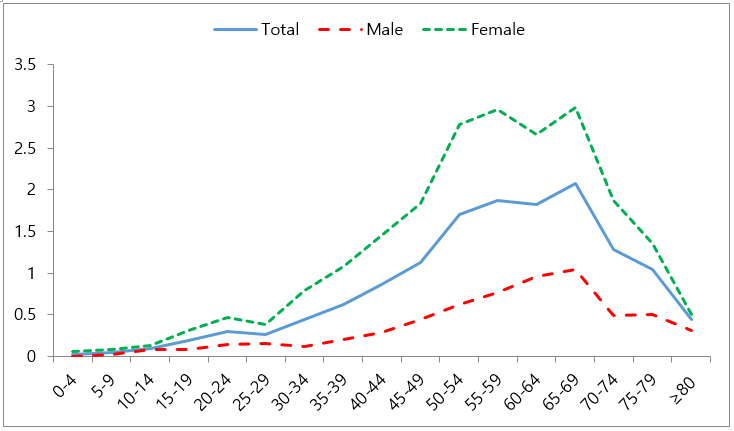Session Information
Date: Monday, November 6, 2017
Title: Epidemiology and Public Health Poster II: Rheumatic Diseases Other than Rheumatoid Arthritis
Session Type: ACR Poster Session B
Session Time: 9:00AM-11:00AM
Background/Purpose:
Systemic sclerosis (SSc) is an autoimmune connective tissue disease characterized by small vessel vasculopathy, autoantibody production, and excessive collagen deposition in the skin and internal organs. Its clinical manifestations and progressions are chronic and diverse. Studies on epidemiology and mortality of systemic sclerosis (SSc) at the national level are scarce. To investigate incidence, prevalence, mortality, and causes of death in SSc patients using nationwide population based data in Korea.
Methods:
We used data from the Rare Intractable Disease (RID) registry and Health Insurance Review and Assessment (HIRA) service, which include information on all SSc patients diagnosed based on uniform criteria between 2008 and 2013. The RID¡¯s diagnostic criteria for SSc adopt the 1980 criteria of American College of Rheumatology. We linked the data from Statistics Korea to the HIRA-RID database to confirm the causes of death.
Results:
The mean annual incidence of SSc in Korea was 8.0 per 106 population, with a female-to-male ratio of 3.9:1. The prevalence in 2013 was 77.7 per 106 population. The average annual mortality was 1.40 per 106 people, and the standardized mortality ratio was 4.34. The 5-year survival rates were 88.5%, which was significantly lower than the age-gender matched general population. SSc was the most common cause of death (36.5% of total death), followed by malignancy (18.2%), cardiovascular diseases and respiratory diseases (10.7%, each).
Conclusion:
Incidence and prevalence of SSc in East Asian countries is considered to be lower than in North America and Australia, but higher than in Northern European countries. The higher mortality of SSc patients compared to the general population is attributable to SSc related diseases, lung cancer and respiratory diseases. Post-diagnosis survival of SSc patients was better than previous studies, which may represents a recent improvement in patient management.
Figure 1. Incidence of Systemic sclerosis by sex and age in Korea, 2008–2013. The vertical axis shows incidence rates per 105 population; the horizontal axis shows age in 5-year increments until the age of 80.
To cite this abstract in AMA style:
Jung KH, Kwon SR, Lee JH, Ahn HS, Kim HJ, Kang GW. Epidemiology and Mortality in Systemic Sclerosis in South Korea: A Nationwide Population-Based Study [abstract]. Arthritis Rheumatol. 2017; 69 (suppl 10). https://acrabstracts.org/abstract/epidemiology-and-mortality-in-systemic-sclerosis-in-south-korea-a-nationwide-population-based-study/. Accessed .« Back to 2017 ACR/ARHP Annual Meeting
ACR Meeting Abstracts - https://acrabstracts.org/abstract/epidemiology-and-mortality-in-systemic-sclerosis-in-south-korea-a-nationwide-population-based-study/

